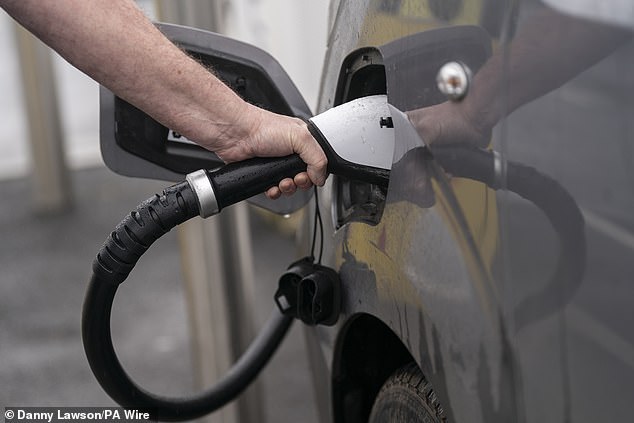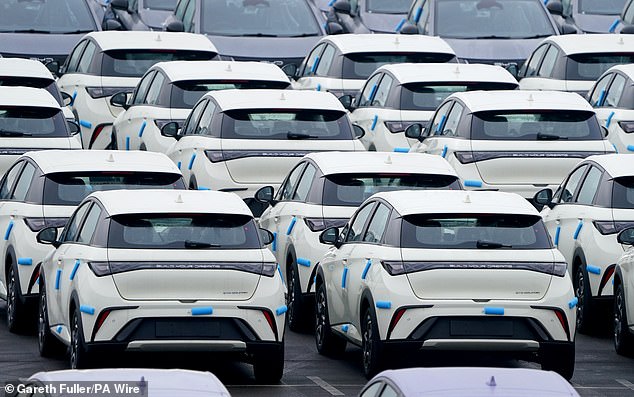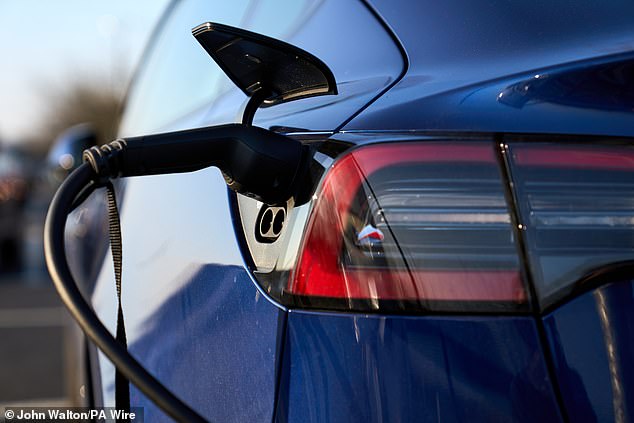Britain is better suited for a switch to electric cars than any of our European neighbours.
That’s according to a new report looking at how easily different countries could switch to EVs based on current driving patterns.
Two-thirds of UK cars and vans currently used by private owners and public sector organisations could easily be replaced by electric vehicles – and this would save drivers and businesses money, transport solutions company Geotab found in its analysis.
The claim comes despite the UK having some of the poorest EV incentives on offer when compared to European rivals and major concerns about switching to battery cars sparking a decline in demand in recent months.

A new report from Geotab has found that the UK is by far the most ‘EV suitable’ country in Europe, scoring 66 per cent versus Spain’s 43 per cent and Germany’s 35 per cent
The ‘Taking Charge: On the Road to an EV future‘ report analysed driver data from 1.3 million cars and vans across seven countries over 12 months.
It found that 66 per cent of UK vehicles currently on the road are ‘EV suitable’ based on two metrics – this meant that they could easily be swapped for an electric vehicle, not that the actual vehicle could be turned into one.
The first metric measured average daily driving distances recorded by motorists – and determined whether these could be covered by EVs on sale today based on existing ranges.
It found that, in order to be range capable, an EV would need to be able to drive 98 per cent of the days per year on a single charge.
The second metric considered whether moving to an EV would save companies money over lifetime ownership.
Firms would save an average of £13,279 per vehicle over seven years (a typical replacement cycle for a fleet vehicle) – equating to a saving of £876,414 on a large fleet of 100 vehicles, the study concluded.

Firms would save an average of £13,279 per vehicle over seven years (a typical replacement cycle for a fleet vehicle) – equating to a saving of £876,414 on a large fleet of 100 vehicles
If the replacement cycle extended to 10 years – in line with the longer lifespan of EVs versus petrol and diesel counterparts, thanks to service, maintenance and repair (SMR) savings – the figure would increase to 73 per cent, Geotabs said.
The UK’s 66 per cent figure beat Canada (50 per cent), Spain (43 per cent), the US (38 per cent), Germany (35 per cent), Italy (28 per cent) and France (20 per cent).
The news that the UK is the best market for fleets to switch to EVs comes after sales data for 2024 so far showed fleet EV uptake far outweighs purchases made by regular motorists, with private EV sales stalling.
EV uptake outstripped the rest of the market, rising 21.8 per cent to a grand total of 14,991 registrations, SMMT data found. This accounts for 17.7 per cent of total registrations and is a nose ahead of last year’s 16.5 per cent share.
However, private buyers account for less than one in five (18.2 per cent) of new EVs registered in 2024.

Fleet EV sales are responsible for the majority of UK BEV sales as of early 2024. If fleets switched to EVs it could reduced 2.2 billions gallons of fuel from conventional vehicles
As well as financial and logistical benefits, Geotab concluded that if fleets switched to EVs it could reduced 2.2 billions gallons of fuel from conventional vehicles.
Over 19 million metric tons of CO2 emissions over the next seven years would be avoided.
In 2021, the UK produced 427 MtCO2e (Million Tonnes of carbon dioxide equivalent) of greenhouse gas (GHG) emissions, up 5 per cent from 2020, according to Department for Transport figures.
Transport produced 26 per cent of the total emissions that year – 109 MtCO2e – and is the largest emitting sector. Some 91 per cent of emissions from domestic transport came from road vehicles – 100 MtCO2e.
Currently, the Earth is around 1.1°C warmer than it was in the late 1800s, and emissions continue to rise, figures show.
The UN has stipulated that to keep global warming to no more than 1.5°C, emissions need to be reduced by 45 per cent by 2030 and reach net zero by 2050 – as signed in the Paris Agreement.

Transport produced 26 per cent of the total emissions that year – 109 MtCO2e – and is the largest emitting sector. 91 per cent of emissions from domestic transport came from road vehicles – 100 MtCO2e. The adoption if EVs by private and public companies would help to reduce this
David Savage, Vice President for the UK and Ireland at Geotab said: ‘The idea that the UK is not ready for mass EV adoption is a fallacy.
‘On the contrary, it’s time for British businesses to ‘double down’ on fleet electrification – not just for the good of the environment and our collective climate goals but for their bottom line.
‘A visionary CEO of a business operating a vehicle fleet could effectively pay their own salary by going electric, thanks to EVs’ financial savings’.
Some links in this article may be affiliate links. If you click on them we may earn a small commission. That helps us fund This Is Money, and keep it free to use. We do not write articles to promote products. We do not allow any commercial relationship to affect our editorial independence.







